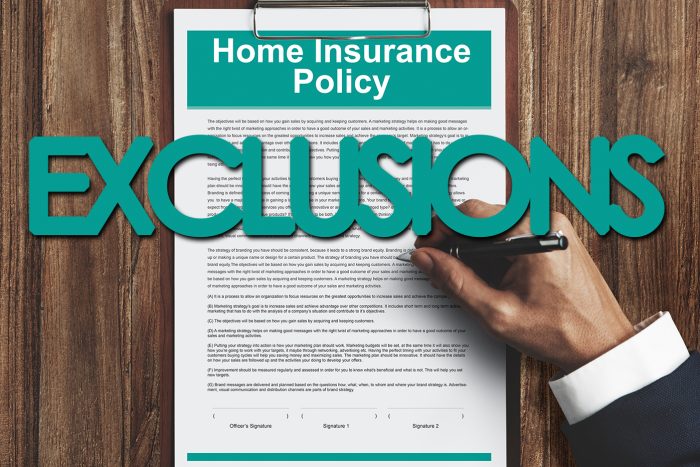Common Homeowners Insurance Exclusions

Common Homeowners Insurance Exclusions
While having insurance can be a life-saver, there are still limits to what insurance policies will cover. If insurance companies covered every possible kind of damage to a home, there would no longer be insurance. Why? Because insurance companies would be paying out so many claims that they would eventually go bankrupt. For this reason, insurance companies have very carefully worded contracts that state what is and what is not covered by your policy. If you’ve never read the contract of your insurance policy, you should read it for your own benefit.
There are multiple kinds of home insurance policies and coverages that vary depending on your insurance company. The following is a short list of risks that are typically excluded from a homeowners policy.
- Earth movement. What does “earth movement” include?
- Sinking– the settling of the ground under your home could cause problems to the foundation of your home, which is typically excluded from your policy.
- Rising–usually this occurs as a result of too much water in the soil, causing the soil to expand. This can also cause problems for the foundation of your home.
- Shifting
- Expanding
- Any kind of mass movements of the earth that causes damage to your home is usually not covered by insurance.
- Any groundwater that causes the flooding of your home is typically not covered by your homeowner’s policy. However, some insurance companies offer a separate policy that may provide the coverage you need. Contact your independent insurance agent to see if you can purchase an additional flood insurance policy.
- If hurricanes are common in your neck of the woods, wind damage is often excluded from your policy.
- Beware of mice, insects, and other critters–should they invade your home, you’re on your own for extermination. Too bad critters don’t pay rent!
- If the mold occurs due to negligence or poor maintenance, it’s likely you’ll have to pay for the damages out of pocket.
Remember: potentially, there are many more risks that may not be covered by your policy. Always call your independent agent with questions regarding coverages. It’s important that you know what your policy includes and excludes.
We are lucky for the risks that insurance companies do provide coverage for. Without our insurance policies, the quality of our lives would decrease tremendously with the event of a major loss. This information is simply to make you aware and better prepare you for future incidents.
Do you have questions about your insurance? Find an insurance agent near you with our Agent Finder
Search All Blogs
Search All Blogs
Read More Blogs
Tax Prep & Protection: Ensuring Your Home Office is Fully Insured for 2026
Prepping your taxes? Don’t forget to check your home office insurance. Your standard policy might not cover your professional gear or liability.
More Than Just a Sale: The Fascinating Evolution of Presidents’ Day
Why is Presidents’ Day on a Monday? Explore the history, the politics, and the trivia behind our mid-February celebration of national leadership.
The Presidents’ Day Shutdown: Managing Risk During Holiday Closures and Sales
Closed for the holiday or open for a sale? A business guide to managing liability, employee pay, and property security during Presidents’ Day weekend.
A Presidential Legacy: Using Life Insurance to Fund Your Charitable Vision
What will your legacy be? Learn how to use life insurance to make a significant charitable impact this Presidents’ Day without depleting your current savings.
The Presidents’ Day Purchase: Navigating Insurance and Gap Coverage for Your New 2026 Vehicle
Buying a new car this Presidents’ Day? Make sure your insurance keeps up. Essential tips on Gap coverage and new vehicle replacement riders.
Water, Water Everywhere: Preparing Your Home Insurance for the Late-February Thaw
Is your basement ready for the thaw? Learn why standard home insurance doesn’t cover sump pump failure and how to add the right protection this February.
Beyond the Box of Chocolates: The Strange and Surprising History of Valentine’s Day
From Roman rituals to Victorian cards: Discover the bizarre and bloody history of how Valentine’s Day became the holiday we know today.
The Big Game Gamble: Managing Business Liability and Hosting Risks for Super Bowl LX
Is your business ready for the Big Game? Key tips on managing liquor liability, event safety, and employee productivity during Super Bowl weekend.
A Gift Beyond Roses: Why Life Insurance is the Ultimate Expression of Valentine’s Day Love
Roses fade, but financial security lasts. Discover why life insurance is the most selfless Valentine’s Day gift you can give your family this year.
The February Pothole Patrol: Navigating Winter Road Damage and Your Auto Policy
Potholes are a February tradition. Learn how your auto insurance handles wheel and suspension damage and how to file a claim for road-related hazards.










